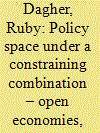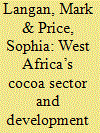|
|
|
Sort Order |
|
|
|
Items / Page
|
|
|
|
|
|
|
| Srl | Item |
| 1 |
ID:
102767


|
|
|
|
|
| Publication |
2011.
|
| Summary/Abstract |
This paper examines the contribution of exports to growth in China since the early years of the decade. It is estimated that, despite a high import content ranging between 40 and 50 percent, approximately one-third of Chinese growth before the global crisis was a result of exports, due to their phenomenal growth of some 25 percent per annum. This figure increases to 50 percent if spillovers to consumption and investment are allowed for. The main reason for excessive dependence on foreign markets is underconsumption. This is due not so much to a high share of household savings in GDP as to a low share of household income and a high share of profits. It is argued that China can no longer maintain such high growth rates for its exports, and, therefore, needs to turn to consumption-led growth by expanding the share of wages and household income in GDP and accelerating public spending in social infrastructure.
|
|
|
|
|
|
|
|
|
|
|
|
|
|
|
|
| 2 |
ID:
141893


|
|
|
|
|
| Summary/Abstract |
The EU has loudly voiced its intention to facilitate poverty reduction and democratisation in North Africa. In particular, it seeks to conclude Deep and Comprehensive Free Trade Agreements (DCFTAs) with Tunisia, Morocco and Egypt. These are seen as a vital response to the Arab Spring – integrating North African countries into the globalised economy. Applying a moral economy perspective, this article argues, however, that, while ‘Normative Power Europe’ seeks to build more tranquil societies in the region, its trade policies nevertheless threaten to exacerbate poverty and social unrest. The prospect of de-industrialisation in the wake of FTAs will do much to entrench economic asymmetries between the European metropole and its neighbours.
|
|
|
|
|
|
|
|
|
|
|
|
|
|
|
|
| 3 |
ID:
166692


|
|
|
|
|
| Summary/Abstract |
Small island developing states (SIDS) face significant economic, social and environmental challenges. Current mainstream approaches to SIDS recognise these limitations and thus promote increased economic integration into the international economy to provide the governments with resources and power to counter the effects of these challenges. Yet these remedies have so far led to high levels of deficits and high levels of indebtedness, as well as high levels of vulnerability and dependence on key sectors that offer very income- and economically sensitive products and services. In addition, and in assessing the experience of Caribbean SIDS, these remedies have led to diminishing government policy space. This has in turn contributed to the lack of real innovation in the way Caribbean SIDS interact with the volatile international market. While much has been written about the economic impact of open markets and the inherent weaknesses within SIDS, the analysis herein allows for the development of a more comprehensive assessment of the implications for the SIDS’ policy space as well as their ability to regain it and develop innovative approaches that avoid uniquely reactionary measures to the current international economy and its gyrations.
|
|
|
|
|
|
|
|
|
|
|
|
|
|
|
|
| 4 |
ID:
171245


|
|
|
|
|
| Summary/Abstract |
The EU is vigorously pursuing Economic Partnership Agreements (EPAs) in its trade and aid relations with African, Caribbean and Pacific (ACP) countries. Justifying the EPAs as being ‘development friendly’, EU officials promise that aid support to private sector development (PSD) in ACP countries will make free trade systems ‘win–win’. This article, based on the authors’ semi-structured interviews conducted in Ghana and Nigeria, examines the perspectives of cocoa stakeholders vis-à-vis EPAs and PSD. Applying critical discourse analysis to interview transcripts, it underscores areas of overlap and, crucially, divergence among cocoa stakeholders’ own narratives on PSD support in the context of EPAs and the official legitimating discourse of EU institutions. In the process, the article draws critical attention to cocoa business interviewees’ concerns regarding the impact of premature trade liberalisation. It also underscores cocoa stakeholders’ concerns that EU PSD promises are not being fulfilled in terms of actual tangible benefits for business people in this vital ACP export sector. Accordingly, the article contributes to, and corroborates, an existing critical scholarly literature which problematises the strategic functions of donor PSD discourse in presenting free trade reforms as being ‘pro-poor’ in the post-Washington Consensus.
|
|
|
|
|
|
|
|
|
|
|
|
|
|
|
|
|
|
|
|
|